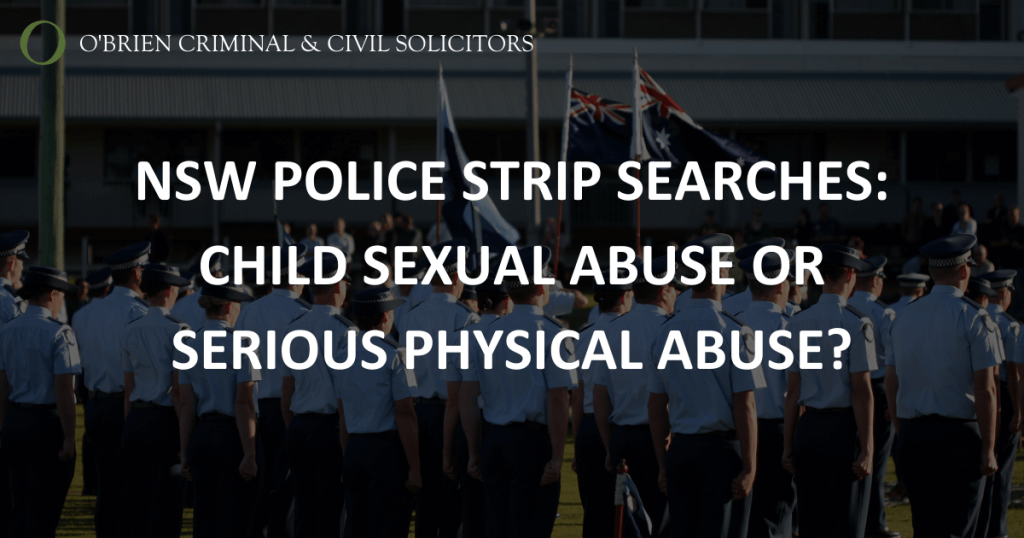Analysis of Anderson v State of New South Wales
The District Court of NSW recently considered the application of the Limitation Act 1969 (NSW) to a case involving NSW police strip searches of children which happened ten years ago.
NSW Police strip searches and detention of two innocent boys
The Plaintiffs, Mr Jade Anderson and Blade Perri, were 14 and 13 years old at the time of the strip search in question. Anderson and Perri were walking around the University of New South Wales (UNSW) campus with other boys their age. One of the other boys with them stole a woman’s phone.
Neither Plaintiff witnessed this incident. UNSW security came and picked them up and escorted them to a room on campus. Soon after, NSW Police officers arrived on the scene. The officers told both boys that they were under arrest. Both Plaintiffs recalled feeling anxious and ‘freaked out.’
The boys then experienced a pat down search and the police promptly conveyed them to Maroubra Police Station by paddy wagon. One of the Plaintiffs rode in the back seat of the paddy wagon as he was claustrophobic.
The NSW Police officers also informed the boys that if they did not comply, the officers would forcibly strip and search them.
However, male NSW Police officers took each Plaintiff to a cell and strip searched them. As part of the search, NSW Police officers ordered the boys to remove all their clothing, squat naked, and lift their genitalia. Both followed the NSW Police officers’ instructions.
Later, Police released the boys without charge. The boys then immediately informed a responsible adult of what had occurred.
Years later, boys try sue police
In July 2021, they initiated proceedings in the District Court of NSW alleging that the Plaintiffs experienced battery, assault, and false imprisonment by the NSW Police.
The allegations are:
- The battery occurred when NSW Police officers touched the Plaintiffs during the pat down search on the UNSW Campus
- the strip search was an assault because the Plaintiffs feared immediate physical contact from the NSW Police officers present if they did not comply
- false imprisonment for the time the Plaintiffs were in detention.
The Limitation Act and Definition of Abuse
In general, plaintiffs may file an action within 6 years of the date it first accrues. In this case, within 6 years of the assault, battery and false imprisonment alleged by the Plaintiffs. However, the Plaintiffs also claimed personal injury, which requires that proceedings be initiated within three years of the Plaintiffs discovering the injury.
The Plaintiffs appeared to have run out of time to commence an action. However, they decided to rely on an exception to limitation periods contained in Section 6A of the Limitation Act 1969. (NSW).
Brief Explainer on Section 6A
-
- Legislators added Section 6A to the Limitation Act 1969 (NSW) following the Royal Commission into Institutional Responses to Child Sexual Abuse
- It removes the limitation period for claims involving the serious physical or sexual abuse of children.
- This exception also covers abuse connected to the serious physical or sexual abuse of children.
The plaintiffs argued that:
- The actions of the relevant NSW Police officers were a sexual process contrary to community standards.
- Strip searches constituted child abuse for the purposes Section 6A. There was no lawful justification for conducting the searches.
Ultimately, the Court did not agree.
NSW Police Strip Searches: Reform and consideration needed
Since the amendment of the Limitation Act 1969 (NSW), the courts have not given much thought to what constitutes sexual abuse or serious physical abuse. As a result, the Court needed to consult the parliamentary second reading speech relating to section 6A as well as relevant excerpts from the Royal Commission into Institutional Responses to Child Sexual Abuse report.
The Court acknowledged that child sexual abuse can include a wide range of behaviours, including invasion of privacy. This passage from the Royal Commission’s report was important:
‘Violation of privacy includes forcing a child to undress or watching a child in a private space … it is also described as voyeurism or peeping’
His Honour acknowledged that in some cases, watching or forcing a child to undress may be a violation of their privacy. However, for the Court to consider the behaviour to be child abuse, it must have a sexual connotation.
Thus, the Court determined this not to be the case in the Plaintiffs’ strip searches. While the strip searches were ‘deeply regrettable,’ no such sexual connotation existed, This meant that they could not be considered child abuse under section 6A.
The Plaintiffs argued that the alleged personal injury was not ‘discoverable’ until they sought legal counsel approximately three years ago. This argument was also rejected because the Plaintiffs had spoken to capable people (their adult members) in the immediate aftermath who should have sought advice.
Ultimately, the Plaintiffs were unsuccessful and the Court ordered them to pay the Defendant’s costs.
If you believe you or your child experienced an unlawful strip search by police or corrective services call us on 02 9261 4281 immediately. One of our civil lawyers will help you determine if you have a case.

Nicole Byrne
Content Creator | Media Coordinator
O'Brien Criminal & Civil Solicitors
- Nicole Byrne
- Nicole Byrne
- Nicole Byrne
- Nicole Byrne
- Nicole Byrne
- Nicole Byrne
- Nicole Byrne
- Nicole Byrne
- Nicole Byrne
- Nicole Byrne
- Nicole Byrne
- Nicole Byrne
- Nicole Byrne
- Nicole Byrne
- Nicole Byrne
- Nicole Byrne
- Nicole Byrne
- Nicole Byrne
- Nicole Byrne
- Nicole Byrne
- Nicole Byrne
- Nicole Byrne
- Nicole Byrne
- Nicole Byrne
- Nicole Byrne
- Nicole Byrne
- Nicole Byrne
- Nicole Byrne




